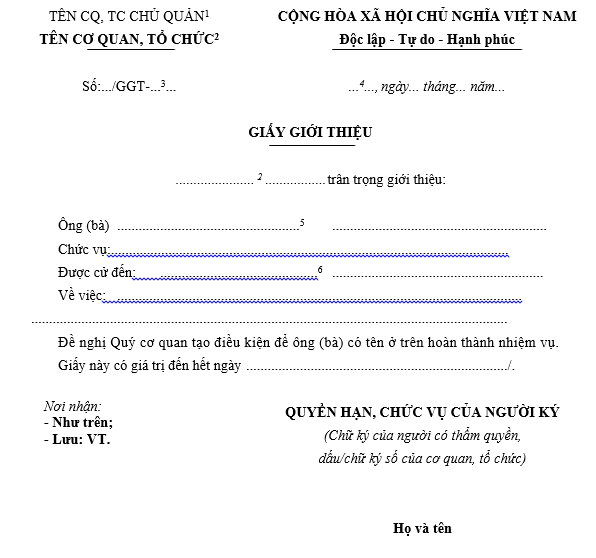Vietnam: What are the guidelines for writing an internship introduction letter for students pursuing Law? What are the methods for training organization at universities?
What are the guidelines for writing an internship introduction letter for students pursuing Law in Vietnam?
Below are the guidelines for writing an internship introduction letter for students pursuing Law in Vietnam:
(1) NAME OF THE SUPERVISORY AGENCY OR ORGANIZATION
(If applicable, e.g., Ministry of Education and Training or Department of Education and Training)
(2) NAME OF THE DOCUMENT ISSUER
(For example: University of .....)
(3) ABBREVIATION OF THE DOCUMENT ISSUER
(For example: DLUHN)
INTRODUCTION LETTER
No: …………………
(4) Location, date
To:
………………………………………………………………… (Name of the agency or organization to which the introduction is made, for example, People's Court of District X).
Pursuant to:
The internship training regulations of the University of ………………
The internship needs of the students pursuing Law, course ……………
The University of ………… introduces:
(5) …………………………………………………………
Student of class: …………………………………………………
Training system: …………………………………………………
Course: ……………………………………………………
Position/Working unit: students pursuing Law, University of ………………
Authorized to contact and intern at:
(6) …………………………………………………………
(Address of the agency or organization being introduced to work at).
Internship period: from date Month Year to date Month Year
We kindly request the agency's support and assistance.
Sincerely thank you!
Signature
(Sign, clearly write full name and seal if applicable)

Download the internship introduction letter template for students pursuing Law
Note: The information is for reference only!

What are the guidelines for writing an internship introduction letter for students pursuing Law in Vietnam? What are the methods for training organization at universities in Vietnam? (Image from the Internet)
What are the methods for training organization at universities in Vietnam?
According to Article 3 of the Regulations issued with Circular 08/2021/TT/BGDDT, the methods for training organization at universities in Vietnam are as follows:
1. Year-based training:
- Year-based training is a method for training organization where all mandatory units of study of the training program are organized into relatively fixed classes, allowing students of the same class to follow the standard learning plan and a common schedule, except for elective or retaken units of study;
- Students with satisfactory study progress may advance to the next year according to the standard learning plan and shall retake failed units of study in compliance with regulations of the training program;
- Students with unsatisfactory study progress shall retake failed units of study together with students of the next cohort in compliance with regulations of the training program.
2. Credit-based training:
- Credit-based training is a method for training organization where units of study are organized into classes as appropriate to the teaching plan of the training institution, allowing students to accumulate credits of each unit of study and take the training program following their individual learning plans;
- Students failing a mandatory unit of study shall retake that unit of study or take an equivalent unit of study according to regulations of the training program or a substituting unit of study if the unit of study that they fail is no longer taught;
- Students failing an elective unit of study shall retake that unit of study or take another elective unit of study according to regulations of the training program.
3. Training institutions shall select and adopt methods for training organization as follows:
- Adopt credit-based training for all cohorts and modes of study in a consistent manner;
- Adopt year-based training for all cohorts and modes of study in a consistent manner;
- Adopt credit-based training for some cohorts or one mode of study; and adopt year-based training for the other cohorts or mode of study.
What are the modes of study at universities in Vietnam?
According to Article 4 of the Regulations issued with Circular 08/2021/TT/BGDDT, the modes of study at universities in Vietnam are as follows:
1. Full-time mode of study:
- Teaching activities shall take place in training institutions, and practicals, internships, practical experiences and online teaching may be carried out outside of training institutions;
- Teaching activities shall take place between 6 AM and 8 PM from Monday to Saturday; activities specific to training programs shall be organized according to regulations of training institutions.
2. Part-time mode of study:
- Teaching activities shall take place in training institutions or institutions involved in joint training according to regulations on joint training in Article 5 of this Regulation; and practicals, internships, practical experiences and online teaching may be carried out outside of training institutions and institutions involved in joint training;
- Teaching time may be scheduled flexibly.
3. For academic disciplines needing to be prioritized for socio - economic development for each period, the Ministry of Education and Training shall provide guidelines for the modes of study applied to them.

